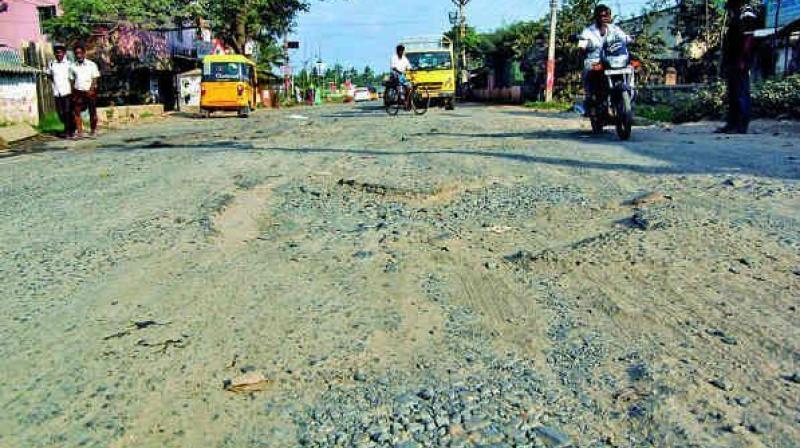Hyderabad: At 5 kmph, commuters lose Rs 9 crore daily as fuel expense
Hyderabadis have been indirectly spending Rs 3,000 crore yearly

Hyderabad: Improper stormwater network has not only been damaging city roads frequently but has also brought down the average speed limit from 40 kms per hour to 5 kms per hour, according to a study conducted by experts from Jawaharlal Nehru Technological University, Hyderabad (JNTUH). The study also revealed that Hyderabadis, apart from paying property tax for basic civic amenities, have been indirectly spending Rs 3,000 crore annually besides being at risk for travel and psychological strain. Due to severe traffic snarls, the commuters have been spending more than Rs 9 crore on a daily basis.
JNTUH experts felt that the conventional methods followed by the corporation in laying city roads have been resulting not only in severe road damage even after moderate rainfall but also the formation of enormous number of potholes and craters. However, in their report, the experts suggested to the civic body that rather than spending Rs 1,000 crore on regular road maintenance, it could strengthen the stormwater network, construct rainwater harvesting pits at identified locations and make minor changes in road designs to relieve commuters permanently from traffic jams, water stagnation all over the place and flooding.
A study headed by Mr K.M. Lakshmana Rao, head of JNTU civil engineering, said that the road network in the GHMC area was affected by the rainwater flow. Over the years, the riding quality of motor vehicles has fallen alarmingly due to the formation of potholes not during monsoons but also unseasonal rainfall during April-May and October-November. The road damaged due to rainfall has affected vehicular speed, functionality of the road, reduced traffic capacity, enhanced risk of travel and health, he said. Apart from this, the pollution levels in the city had also been increasing at an alarming pace because 30 lakh vehicles hit the road daily and faced bumper to bumper traffic during peak hours on any given day.
K.M. Lakshmana Rao in his report said that if the cost of travelling for 1.5kms was Rs 6 on an average, taking all the vehicle compositions into account, commuters had been spending Rs 9 crore in excess towards fuel charges per day. “If this scenario of poor road conditions prevails for 3 months, it costs Rs 810 crore. If the same continues for one year assume around 300 days of peak interactions it would cost nearly Rs 2,700 crore. By considering other shadow impacts in terms of physical strains and value of travel time, it may even be higher than Rs 3,000 crore per annum,” he explained.
The JNTU expert said that the permanent solution to give a facelift to city roads and riding quality did not involve rocket science but simple methods. He said the condition of city roads could be improved by giving geometric facelift, constructing rainwater harvesting pits in individual households in order to prevent rainwater from entering onto the roads, constructing water tanks in public and private lands near the stagnation points.
, and pumping water into them through gravity. Mr Lakshmana Rao said this could be done in a phased manner with 20 per cent of the fuel cost which is being wasted during traffic congestion.

